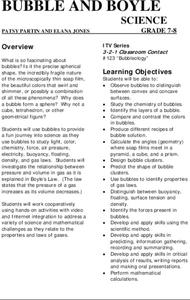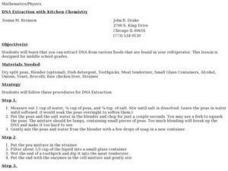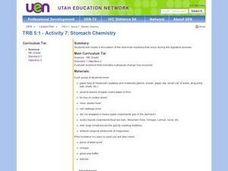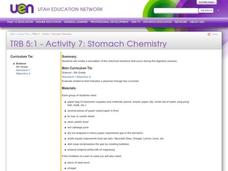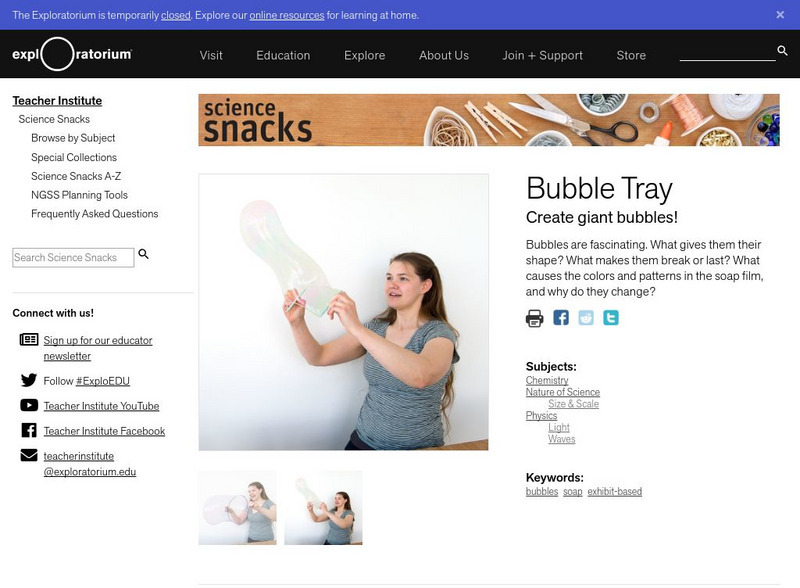Curated OER
Soap Bubble Chemistry
Students investigate soap bubbles. In this soap bubble chemistry lesson, students observe a demonstration using pop-it beads to represent a soap molecule. Students produce soap bubbles in the lab by making bubbles with a large bubble...
Curated OER
Blow the Best Bubbles
Here is an exciting, and meaningful science lesson on the formation of bubbles! Young scientists have three cups with a variety of solutions in them. One cup has detergent only, one has glycerin added to it, and the third has corn syrup...
Curated OER
Bubble and Boyle
Middle-schoolers still enjoy playing with bubbles! In this series of eight laboratory activities, science learners explore convex and concave surfaces, angles, gas laws, buoyancy, density and more!
Exploratorium
Bubble Suspension
Create a cushion of carbon dioxide gas to float some soap bubbles on. Many concepts can be demonstrated through this activity:
Carbon dioxide gas is more dense than air
Bubbles are semipermeable, allowing only carbon dioxide to diffuse...
Curated OER
Bubble and Boyle
Even middle schoolers still enjoy experimenting with bubbles! They execute a series of experiments enabling them to distinguish between convex and concave surfaces, explore the properties of buoyancy, surface tension, and density,...
Steve Spangler Science
Boo Bubbles Bouncing Smoke – Dry Ice Bubbles Experiment
Don't let your lesson plans go up in smoke—unless they include Boo Bubbles, of course! An engaging laboratory mixes liquid soap and dry ice to create smoky bubbles that burst on impact, making it the perfect way to celebrate Halloween in...
Curated OER
Molecular Forces at Work: Creating Soap Bubbles
Students investigate adhesion, cohesion and surface tension. In this molecular forces lesson plan, students observe multiple demonstrations that show surface tension, the attraction of water molecules to each other and the ability of...
Curated OER
Testing Water for Hardness Using Soap Bubbles K-12 Experiments & Background Information
Students examine water and what causes it to become hard. In this water lesson plan students use the soap test and determine the mineral content and hardness of a sample of water.
Curated OER
The Chemistry of Bigger Bubbles
Fourth graders explore properties of bubbles. In this lesson about bubbles, 4th graders perform an experiment. Students analyze the properties of bubble making substances and surface tension. Students create a square bubble. Students...
Exploratorium
Bubble Tray
Create jumbo bubbles and use them to teach about surface tension or interference, perfect for a physical science lesson on light or molecular attraction.
Curated OER
Electrostatics
Students explore charges using balloons and soap bubbles. In this chemistry instructional activity, students analyze the Van de Graaf generator to see how charges flow using charged particles, static electricity and lighting. This...
Curated OER
DNA Extraction with Kitchen Chemistry
Students extract DNA from green peas. In this DNA extraction lesson plan, students use a blender to chop up peas, they mix them with a little soap, they tenderize them and they mix them with alcohol to see the DNA precipitate through the...
Curated OER
Soap Smart, Healthy Fun
Seventh graders investigate the scientific methods of testing the effectiveness of soap use against germs. They study the history and chemistry of soap as it has helped control the spread of germs. They make bubble soap.
Curated OER
Silica Tetrahedron Model
Very simply, pairs of learners construct a model of the tetrahedral silica structure using raisins and toothpicks. They dip it into a soapy solution and then blow a bubble "atom" into its center. The lesson plan gives instructions that...
Curated OER
Lipids: Fats and Oils
A fantastic presentation with great images should improve student understanding of lipids and their involvement in the body. The chemistry of different fats, phospholipids, and steroids are explained. Additionally, the specific uses,...
Curated OER
Lipids: Fats and Oils
A fantastic presentation with great images should improve student understanding of lipids and their involvement in the body. The chemistry of different fats, phospholipids, and steroids are explained. Additionally, the specific uses,...
Curated OER
Activity #14 Floating Bubbles
Learners comprehend that Carbon dioxide gas is relatively easy to generate. They comprehend that one way to produce it is with dry ice. Pupils comprehend that carbon dioxide gas can also be produced by combining baking soda with vinegar.
Curated OER
WS 8.9 Presentation Questions
In this mixtures worksheet, students answer twenty three questions about student presentations on topics such as amalgams, homogenized milk, antifreeze and coolants, soaps and detergents and water softeners.
Curated OER
Stomach Chemistry
Fifth graders compare physical and chemical changes. They perform a simulation experiment/activity that replicates what happens in the stomach as food is digested by stomach acids.
Curated OER
Water
Students conduct a series of investigations on the unique properties of water. In this general science lesson plan, students explain what causes water's surface tension. They explain the different stages in the water cycle.
Curated OER
Chemistry: Mini-Volcanoes
Students observe an experiment using common household chemicals to simulate a volcanic eruption. In small cups, they follow the teacher's instructions to make their own volcanoes. After watching a Brain-pop video, students complete...
Utah LessonPlans
Stomach Chemistry
Students will create a simulation of the chemical reactions that occur during the digestive process. A physical change occurs when the appearance of matter changes, but the composition of the matter does not change.
What affects Frog metamorphosis?
In this lab, students explore pollutants which affect frog metamorphosis using household pollutants (vinegar, oil, and bleach) and sponge capsules.
Exploratorium
Exploratorium: Science Snacks: Bubble Tray
This activity allows students to create and observe giant bubbles.




